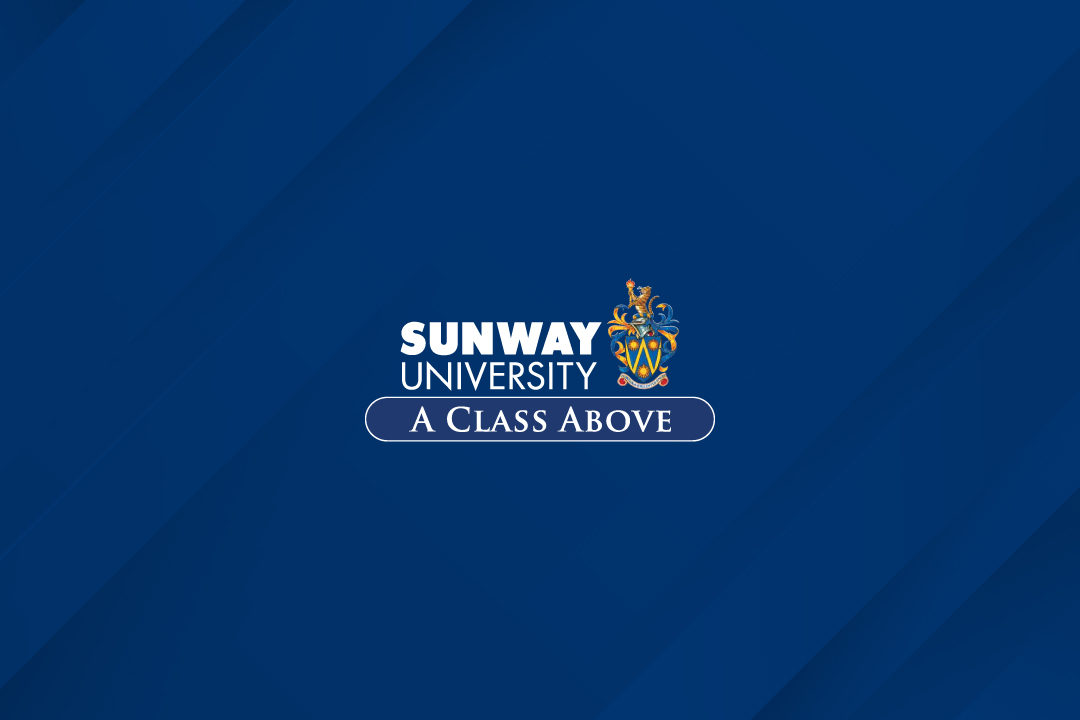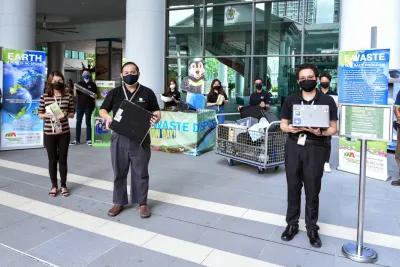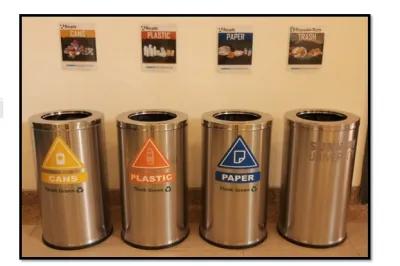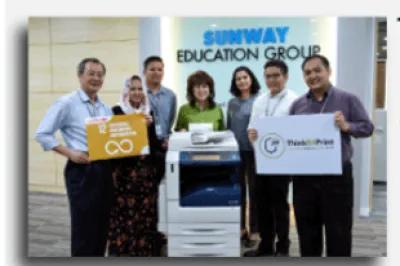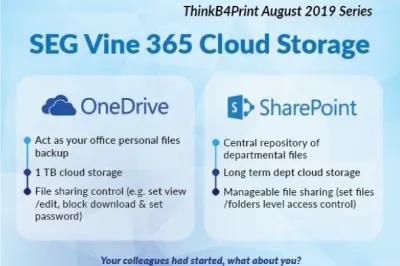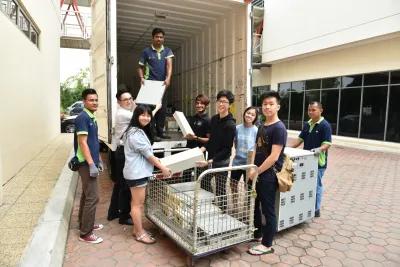What is Waste Management?
Waste management refers to the processes and activities involved in collecting, transporting, treating, and disposing of waste materials generated by human activities. Waste management aims to reduce the negative environmental and health impacts of waste while also recovering valuable resources from waste streams and promoting sustainability.
There are several stages in the waste management process, including:
- Waste generation: This is the stage at which human activities, such as households, businesses, and industries generate waste.
- Collection: This involves the collection of waste materials from the point of generation and transporting them to a waste management facility.
- Sorting and separation: At the waste management facility, waste materials are sorted and separated based on their type and characteristics. This allows for the recovery of valuable materials, such as metals, plastics, and paper, which can be recycled or reused.
- Treatment: Waste materials are treated to reduce their volume and mitigate their environmental and health impacts. This may include processes such as composting, incineration, and landfilling.
- Disposal: Waste materials that cannot be recycled, reused, or treated are disposed of in a responsible manner, such as in a landfill or waste-to-energy facility.
- Tracking: By tracking waste, we are able to set a baseline and work towards reducing the overall waste produced, increasing its diversion (through donation, recycling and composting) over time. Click here for more details.
Effective waste management requires a comprehensive and integrated approach that includes waste reduction and prevention and efficient collection, sorting, treatment, and disposal methods. By managing waste responsibly, we can minimise the negative impacts of waste on the environment and public health, conserve natural resources, and promote sustainability.
What is Sunway Doing?
Leadership
Segregation of Waste and Recycling (3R Store)
Recycle bins are placed in strategic locations across the campus. The bins can take paper, newspaper, magazines & cards, mixed glass and plastic bottles, and metal cans. Internal segregated recycling bins have also been installed in office, administration and teaching areas across the campus.
Waste is separated on a daily basis and will be kept at the 3R Store (Reduce, Reuse and Recycle). There are three types of 3R stores: Furniture and Fittings, ACMV Parts (Air-conditioning & mechanical ventilation), and Cans, Paper & Plastic.
The waste recycling vendors collect this segregated waste on a monthly basis. P&C Documents are disposed of separately quarterly, and metal & aluminium waste from renovations is sold off to the scrap vendor.
Sustainable IT
IT Services has incorporated “Sustainable IT” into campus operations and services that drive energy efficiency and a lighter consumption footprint. This practice would primarily affect but not be limited to our asset life-cycle management and operational practices. An example is the ‘ThinkB4Print’ campaign launched in 2019 to instil paper-saving practices amongst staff and students.
Some of these green practices may also come at an increased initial cost (in the acquisition, inconvenience, etc), but it is still a better choice compared to traditional consumption modes. The University has adopted the following green choices to strive for a greener environment through responsible consumption, even as we continually strive to deploy new technologies.
Composting Room
Sunway University has a composting room on campus to mitigate food waste in landfill. The Composting Room located at the loading bay area at Sunway University is a joint collaboration between Facilities Services and the SMS2E Research Cluster Grand headed by Professor Mohamed Kheireddine and Dr Jane Gew to re-purpose food waste to compost. The Cafeteria tenants and campus cleaners also have an opportunity to join in this composting initiative and learn the whole process of food composting and be educated to assist in the collection of food waste and assist in the composting process. The composted food waste is used as fertiliser for our Herb Garden, landscape, and green lung around campus.
Research
School of Hospitality and Management (SHSM) on Food Waste
As food waste continues to be a global and a pressing national concern, Sunway Young Chefs, part of SHSM, has verbatim taken matters into their own hands to repurpose edible food waste by turning them into a new dish. A digital cookbook based on this idea was published with 30 illustrated dishes. The cookbook has been announced as the national winner for the prestigious Gourmand World Cookbook Awards, under the category of B14 Digital, B22 University Press and D01 Food Waste; and has recently been shortlisted for the Best of the World award which will take place in Umea, Sweden this year.
Automatic Waste Management Network/Database
This research project funded by Sunway University aims to explore the involvement of technology in managing household waste. The prototype from this study was used to conduct a user acceptance test target Sunway Property High-Rise Residential Buildings. With more than 96% positive response, this project is opening a new window to the next-gen household waste management facilities in High-rise buildings.
Education
Micro-credential in Sustainable Waste Management
Sunway University offers a unit in Sustainable Waste Management. The unit aims to curate students who thoroughly understand the socio-economic impact of waste and use it to tackle waste management issues that continue to surface. As waste management continues to become a national issue, Sunway embeds these concerns in our academic curriculum to support likeminded individuals who strive to make a change.
E-Waste Collection Day
E-Waste Disposal collection day is an important day that takes place on campus bi-annually. The purpose of this day is to not only mitigate the amount of e-waste ending up in the landfill, but also to educate young digital native students that there is a way to actively participate in sustainably managing their waste. While the collection day includes collection of small and large e-Waste items, collection points for small e-Waste items are available all throughout the year. It can be found at the Recycle Corners across campus that are accompanied with a clothes bin and shoe bin. Our campus works to become a breeding ground for sustainable behaviour by providing our students with accessible practices.
External Engagement
Food Waste Collection
Sunway University and Sunway College have partnered with a vendor who uses Black Soldier Fly Larvae and earthworms to collect food waste on campus to be turned into fertiliser that can be reused by the community.
Partnership with Kloth Care Programme
Sunway University contributed to the 24,876 kg of used textiles that were collected and recycled in 2020 across the Sunway Group through the Kloth Care Programme. These recycled textiles were donated to charitable organisations, exported to developing countries, reused as industrial wiping cloths and used as fuel for energy. This has helped to reduce the amount of fabric waste ending up in landfills and, in some ways, has also reduced the need for new textiles.
Related Policies/Documents
Activities/Student-led Initiatives
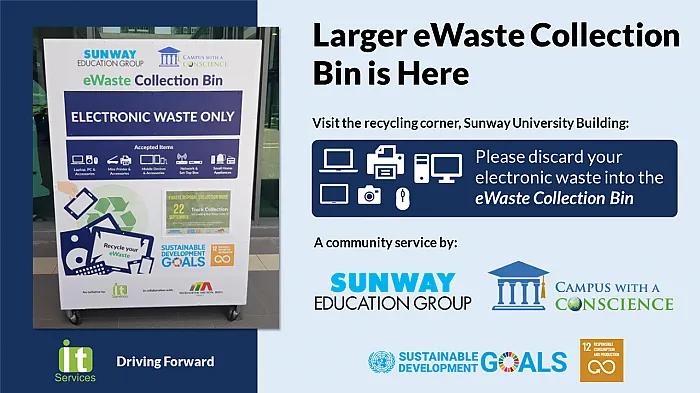
Larger eWaste collection bin at Sunway Uni Building!
For the convenience of disposing of larger eWaste items, IT Services proudly announced that a new “larger eWaste collection bin” is available now at Recycling Corner, Sunway University Building. The bin opening dimension is 990mm X 250mm, this size suitable for disposing notebook, PC, mini printers, network devices, small home appliances, etc.
The usual small green eWaste bins still available at various convenient campus locations (exact location refer to ITS website -> Policies & Guidance -> Sustainable IT -> Sustainable IT Journey) for disposing smaller eWaste items like phone, batteries, charger, cable, bulbs, etc. The “new larger eWaste collection bin” is a concerted effort by IT Services, Branding & Corporate Communications, Meriahtek (M) Shd Bhd (campus eWaste partner) and supported by CWAC.
Related Stories
Activities / News
Toxic Waste Management
Sunway University is committed to reducing our impact to the environment. We achieve this by implementing policies and programmes which are monitored through regular audit processes.
The Last Straw Campaign 2019
Sunway Education Group launched the #TheLastStraw campaign on 13th July 2018, to drive awareness for the United Nations Sustainable Development Goals (UNSDGs). The campaign seeks to address UNSDG Number 14 – Life Below Water, and has committed to stop selling water in single use plastic bottles…
Sunway Campus e-Waste Collection Day
Bi-annual campus e-Waste Disposal Collection day was carried out on 28 October 2021 during this new norm period. The campaign started off with a big e-Waste collection bin placed at Sunway University Building foyer from 26 - 28 October 2021 for staff and students to dispose their big e-Waste…
Waste Separation
The University continues to educate its community on waste separation by placing posters next to the recycling bins.
The ThinkB4Print campaign
Launched in April 2019, the ThinkB4Print campaign was launched to create awareness and to encourage all Sunway Staff and Students to save paper out of concern for the environment.
Augmented Reality Campaign Reduces Paper Consumption (2019)
Launched in April 2019, the ThinkB4Print campaign was launched to create awareness and to encourage all Sunway Staff and Students to save paper out of concern for the environment.
Sunway Education Group has Collected 25.3 tonnes of e-Waste Since 2012
Since 2012, Sunway Education Group has inculcated a biannual collection of e-Waste from its staff and students. To participate, members of the Sunway Education Group community make an effort to separate e-Waste from regular household waste and drop off these items at dedicated locations on…


